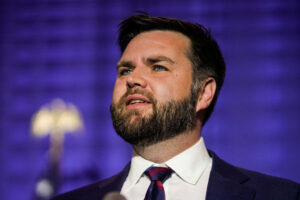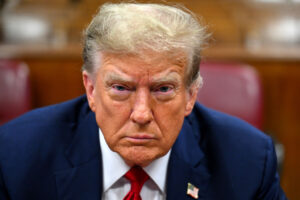Just in case you haven’t spent the last week gripped by the question of who the Republicans would choose to nominate as their candidate for President of the United States, here’s the news: it was him. But it wasn’t exactly the same old same old from Donald Trump.
In the aftermath of the assassination attempt that left his right ear wrapped in a Van Gogh of white rectangular gauze, the former president declared it was time to tone down the rhetoric and to lower the political temperature. Perhaps, as he contemplated a country boiling with hatred and fear, he realised that we might at long last resolve our differences without violence.
So it was with visions of peace, love and understanding that the faithful Trumplicans descended upon the nominating convention in Milwaukee this week, transforming the Fiserv Arena into 714,000 Trump-branded square-feet. The promised kumbaya lasted approximately half a second, as the first chant from the audience — “Fight! Fight! Fight!” — became a recurring refrain.
At one point, as the house band belted out groovy lyrics worthy of the Summer of Love — people everywhere just gotta be free — the crowd rapturously waved signs plastered with the mantra, “MASS DEPORTATION”. The newly minted Christ-like aura of the Prince of Peace included such paraphernalia as an image of Trump’s saintly head taped to a cardboard cutout of a Rambo-style figure holding an assault rifle. Never had such cheers followed the phrase, “razor-wire barriers”. The apotheosis of all this was the bland and passionless narrative delivered by Vice Presidential nominee J.D. Vance, whose ancestors hailed from the backwoods of Appalachia (don’t mention Yale Law School), as he described how after his beloved “Mamaw” had passed to the great beyond, his hillbilly family discovered she had secreted 19 loaded handguns around the house.
“That’s the American spirit,” Vance said.
It’s no news that violence is as American as baseball and hot dogs. It should surprise absolutely no one that Vance’s sweet Mamaw was a cold-blooded champion of what Montana Senator Steve Daines called her “precious right to keep and bear arms” — no matter the bloody shadow of 15 direct assaults on United States presidents, presidents-elect and presidential candidate (five of them resulting in deaths), including JFK in 1963, RFK in 1968, George Wallace in 1972 and Reagan in 1981. Gerald Ford holds a record of sorts, having survived two assassination attempts in one particularly nasty month in 1975.
This week’s convention was spiked with fears of violence not only from an assassin’s bullet, but from Hamas, Hezbollah, the Houthis, EV batteries, spy balloons and robots. North Dakota Governor (and last-minute Trump VP reject), Doug Burgum, added to the general sense of alarm his terrifying vision of rotten refrigerator lettuce, the result of looming “Biden brownouts”. But the greatest fear of all was reserved for global elites, an anxiety that can be traced to the first American presidential nominating convention, which happened just about a century ago, when a man named William Morgan came to personify the same sort of anger and fear as Peter Navarro, Trump’s former United States Trade and Manufacturing Policy Director, who emerged from federal prison Wednesday morning to appear at the convention that same evening.
“I went to prison so you won’t have to,” Navarro reminded the chanting crowd (“Fight! Fight! Fight!”). Then, a bit more ominously: “If we don’t control their government, they will control us.”
Over the past several days, it was that they that kept coming up. “They’ve attacked his reputation, they impeached him, they tried to bankrupt him and they unjustly prosecuted him,” cried South Dakota Governor and dog assassin Kristi Noem. (“Fight! Fight! Fight!”) “They’re after all of us,” said Eric Trump. “They have failed. They will not win.” (“Fight! Fight! Fight!”) “When they took a shot at my hero,” Hulk Hogan cried, slowly ripping off his shirt, “and they tried to kill the next president of the United States — enough was enough.”
As it turns out, concerns about the they people reached a peak of sorts way back in 1832, when the country was massacring natives on its way to establishing an empire larger than all of Europe, at the forefront of which lay an inexorably expanding frontier inhabited by barely literate devil-fearing bible-thumping bumpkins armed to the teeth. Back then, the they people were, as a general rule, Freemasons. Among the 16,000 Americans who then belonged to the secret society were politicians, judges and wealthy businessmen. Founded 100 years earlier in Europe by one of Sir Isaac Newton’s students, the Masonic goal was to establish an international cohort of intellectual and cosmopolitan free-thinkers. Speaker of the House Mike Johnson would have described them as the first avatars of “the radical woke progressive Left” who dreamed of a “borderless” utopia. No doubt, the Masons were globalists. They aspired to what has become the three scariest words in the English language for reactionaries before and since: new world order. All of which brings us back to William Morgan.
Like J.D. Vance, Morgan began life as a hillbilly in Culpeper, Virginia. As a young man he moved to Richmond and opened a general store, which promptly failed. Then, once again like Vance, he headed north to settle not too far from Milwaukee — where he anticipated Brew City’s fabled residents Valentin Blatz, Frederick Pabst and Joseph Schlitz, and opened a brewery, which promptly failed. Ever the optimist, Morgan and his wife moved to Genesee County in upstate New York where he was lucky enough to be initiated as a Freemason. Unfortunately, his well-heeled brethren soon caught on to the fact that much like Vance’s mother, Morgan suffered from chronic substance abuse. A drunk and a gambler who could not feed his family of four, he soon found himself banished from the society.
Like many other desperate people before and after (and again, just like Vance), Morgan concluded that the quickest path out of his predicament was literary fame. He would revenge himself against the Masons by revealing all their ceremonies, codes and secrets. Besieged by former fellows who pleaded with him not to publish his compendia of anti-Christian evils practised by the secret secular elite, Morgan wrote steadily until 11 September 1826 — when he was arrested on a trumped-up charge and thrown in jail. The next night he was abducted and never heard from again.
To be sure, there were those who denied that William Morgan had actually been kidnapped, much less murdered. There were rumours he had abandoned his wife and kids for the reaches of the north. There were sightings off the coast of Greece — or perhaps it was the Cayman Islands. There was hearsay Morgan had become an Indian chief in Canada. There were reports he had joined Jean Lafitte and his band of buccaneers. But the most likely denouement was that somewhere in the middle of Lake Ontario his captors had wound a weighted rope around his waist and tossed him off the side of a canoe.
Despite a special prosecutor, 20 grand juries and untold dozens of subpoenas, no murder charges would ever be brought. Kidnapping was then considered a misdemeanour, so the jail sentences that eventually were handed down ranged from one month to two years. When all was said and done, the only indisputable facts were that Morgan had disappeared, and that his abductors had been Freemasons.
At which point, the floodgates of fake news opened and thousands of Masons were thrown off juries, forbidden to preach, barred from communion, denounced as members of a godless gang and made the scapegoats of any act of lawlessness, any murder anywhere. It is no coincidence that precisely the same kind of laws were passed against Freemasons in fascist Vichy France, 100 years later.
The moral of the story is that nothing changes.
On the second evening of the Republican convention, David McCormick, candidate for United States Senate from Pennsylvania, warned against “pro-criminal judges”. Trump lawyer Alina Habba implicated “sham indictments and baseless allegations”. Elise Stefanik, New York Republican Conference Chair, noted the “corrupt democratic prosecutors and judges” of the “Department of Injustice”.
In the wake of the Morgan Affair, the first incarnations of X and Truth Social sprung forth as hundreds of Anti-Masonic broadsheets popped up along the western frontier and the “burned-over” regions of New York State. For every owner of a set of chipped fonts understood the potential: here was an indisputable display of unholy wickedness practised by the privileged classes — the they people. Here was a real-life horror story — that hidden in their midst was an invisible coterie who smiled and shook hands at noon, but swore secret oaths at midnight, held bloodcurdling initiation ceremonies and guzzled diabolical libations from human skulls.
Hashtag Pizzagate.
It is perhaps regrettable that the language of the pundits and political operatives of the 1830s was not all that dissimilar from the rhetoric heard in Milwaukee when Senator Tim Scott observed, “On Saturday, the devil came to Pennsylvania, holding a rifle”. Masonic hands “reek with the blood of human victims offered in sacrifice to devils”, was the message of New Jersey’s Palladium of Liberty. Not to be outdone, The Middlebury Free Press presented a dialogue among the demons Belphegor and Beelzebub, in which Freemasonry featured as Satan’s “empire on earth”.
And just as MAGA appeared to explode out of nowhere, within a year of William Morgan’s disappearance, dozens of Anti-Masonic governors took over state houses. Scores of newly elected Anti-Masonic senators and congressmen made their way to Washington. At which point the Anti-Masons decided to nominate one of their own to the highest office in the land.
In the summer of 1832, stagecoach after stagecoach carried more than 100 delegates from 24 states from the steamboat landing in Fells Point to downtown Baltimore. And much like Trump’s daughter-in-law, Lara Trump, co-chair of the Republican National Committee, those who organised the Anti-Masonic presidential nominating convention understood the value of making the spectacle as public as possible. For the first time, they invited the press to witness the decision making, going so far as to assign them seats.
The Anti-Masonic presidential nominee was William Wirt, who had served for a dozen years as United States Attorney General and been Thomas Jefferson’s personal lawyer and adviser, much as Kellyanne Conway is to Trump. Like Conway, Wirt was a gifted rhetorician and fabulist. In fits of grandiloquence arguing before the Supreme Court, he had conjured the sons of Atreus, the House of Priam and the fierce Achilles. And that was for a case about waterway rights between New York and New Jersey.
Wirt’s many detractors insulted his verbal genius by dismissing his ostentatious oratory as “whipped syllabub” (a great insult at the time), but advanced vocabulary brought him what money couldn’t, starting with two excellent marriages. The first came with ownership of a plantation near Charlottesville, dozens of slaves and family connection with Virginia’s aristocracy — men who would soon make good use of his high-flown language and penchant for hero worship.
The parallels with J.D. Vance’s career are uncanny. Wirt, an orphan, had humble beginnings. Like Vance, he became a famous writer and, eventually, a jewel in establishment’s crown. At which point he decided on his grandest project yet. He would create his own version of American history, one in which the slaveholders and whiskey manufacturers were epic heroes like those he had discovered in Homer and Virgil. And just as Marjorie Taylor Greene declared at the convention that Trump was the “founding father of the America First movement”, Wirt would also create a new founding father by writing the now classic biography of Patrick Henry — someone Wirt had never met, never seen and never heard speak.
No matter.
Wirt described Patrick Henry’s voice as a fountain, a river, the ocean itself. Much like Trump — described this past week as having the heart of a lion, the soul of a warrior and the man who would stand at the gates of hell to defend our great country — Patrick Henry was Samson, Demosthenes and Charles the Fifth wrapped into one. He was a noble savage, a miracle, a prodigy. He had cared nothing for education, but was the smartest man in the room. He had cared nothing for money, but riches flowed his way. And that was how Henry — the ignorant, rapacious, slaveholding drunk — came to inhabit the American imagination as a paragon of moral perfection. Wirt had not only created the hero but his rallying cry for the new nation: “Give me liberty, or give me death!”
Had he ever said such a thing? It’s doubtful.
John Tyler, tenth President of the United States, called Wirt’s biography “a great novel”. Jefferson kept the book in the fiction section of his library. John Adams read Sketches of the Life and Character of Patrick Henry and said: “If I could go back to the age of thirty-five, Mr. Wirt, I would endeavor to become your rival, — not in elegance of composition, but in a simple narration of facts.”
Thus the genealogy of fake news can be traced from Wirt’s biography to Kellyanne Conway’s interview on “Meet the Press” in January 2017, when she defended Trump’s erstwhile Press Secretary Sean Spicer’s lies about the number of people who had attended Trump’s first inauguration. At long last, Conway was able to articulate what Wirt and the Anti-Masons had discovered long ago: the power of alternative facts.
Wirt knew full well the they people of 1832 were harmless. He himself had been a Freemason — along with Franklin, Voltaire, George Washington and the great Andrew Jackson, who had been Masonic Grand Master of Tennessee. But that did not stop Wirt from standing before the Anti-Masonic convention and vowing that the cult was involved in a “wicked conspiracy against the laws of God and man, which ought to be put down”. Nor did it matter much that Donald Trump’s political idol — again, Andrew Jackson — would soon destroy Wirt and Henry Clay and every other political opponent in the electoral college landslide of 1832, which cemented Jackson’s second term. What mattered was that fear of the they people had reached the centre of American politics — those who had since time immemorial, to quote Tucker Carlson’s strange speech on the final night of the convention, delivered “a middle-finger in the face of every American”.
As the echoes of Kid Rock’s off-kilter lip-synced rap faded in the stale arena air on that last night of the convention, so did every pretence of the peace-loving flower-child MAGA drag. “They plunder our nation,” Trump declared in his climactic address to the assembly. “They wipe out our people.” “They took over our country.” “They’re emptying out their insane asylums.” “They used Covid to cheat.” “They think we’re stupid.”
And on and on. Just after midnight the red, white and blue — and, of course, gold — balloons began to fall, and it was clear that soon it would be time for the conventioneers to return to the sticks and provinces to rally the masses. There were only a few hours left for the slots at the Potawatomi casino, at the most one last lazy afternoon to kayak down the Milwaukee River beerline and envision the rebirth of MAGAmerica while drinking Wisconsibly, as they say.
It had been a glorious four days in Brew City. Meanwhile, on the other side of the country, Joe Biden tested positive for Covid and had to go home.
Disclaimer
Some of the posts we share are controversial and we do not necessarily agree with them in the whole extend. Sometimes we agree with the content or part of it but we do not agree with the narration or language. Nevertheless we find them somehow interesting, valuable and/or informative or we share them, because we strongly believe in freedom of speech, free press and journalism. We strongly encourage you to have a critical approach to all the content, do your own research and analysis to build your own opinion.
We would be glad to have your feedback.
Source: UnHerd Read the original article here: https://unherd.com/




